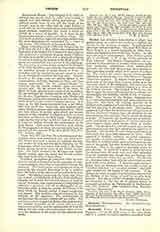

Decree (Lat. decretum, from decerno, I judge), in a general sense, an order or law made by a superior authority for the direction of others. In ecclesiastical use it has various meanings. Any papal Bull, Brief, or Motu Proprio is a decree inasmuch as these documents are legislative acts of the Holy Father. In this sense the term is quite ancient. Pope Siricius speaks (Ep. i, ad Himer., c. ii) of the decreta generalia of Pope Liberius. The Roman Congregations are em-powered to issue decrees in matters which come under their particular jurisdiction. Each ecclesiastical province, and also each diocese may issue decrees in their periodical synods within their sphere of authority. The word is also used to denote certain specified collections of church law, e.g. The Decree of Gratian (Decretum Gratiani). In respect of the general legislative acts of the pope there is never doubt as to the universal extent of the obligation; the same may be said of the decrees of a General Council, e.g. those of the Vatican Council. The Council of Trent was the first to apply the term indiscriminately to rulings concerning faith and discipline (decreta de fide, de reformation). The decrees of the Roman Congregations (q.v.) are certainly binding in each case submitted for judgment. But there are varying opinions as to whether such judgment is to be taken as a rule or general law applying to all similar cases. The common opinion is that when the decisions are enlargements of the law (declaratio extensiva legis) the decisions do not bind except in the particular case for which the decree is made. If, however, the decision is not an enlargement, but merely an explanation of the law (declaratio comprehensiva legis), such decree binds in similar cases. The decrees of a national council may not be promulgated until they have received the approval of the pope. The decrees of a provincial synod have no force until they have been approved by Rome. This approval is twofold: ordinary (in forma communi), and specific (in forma specified). The former means that there is nothing which needs correction in the decrees of the synod, and they thereby have force in the province. This is the approval generally given to such decrees. If approval is given in formd specified the decrees have the same force as if they emanated from the Apostolic See, though they are binding only in the province for which they are made. The decrees of a diocesan bishop deal with the administration and good order of his diocese. If they are made during a synod, they are diocesan laws, are usually known as “diocesan statutes”, or “synodal statutes”, and bind until revoked by the bishop or his successor. If the decrees are extra-synodal, they have force only during the lifetime of the bishop or until he revokes them himself. For the so-called “Decretum Gelasianum” see Pope Saint Gelasius I. For the use of judicial decreta in canonical procedure see Permaneder in Kirchenlexikon, III, 1442-44. (See Ecclesiastical Constitutions; Papal Rescripts.)
DAVID DUNFORD

